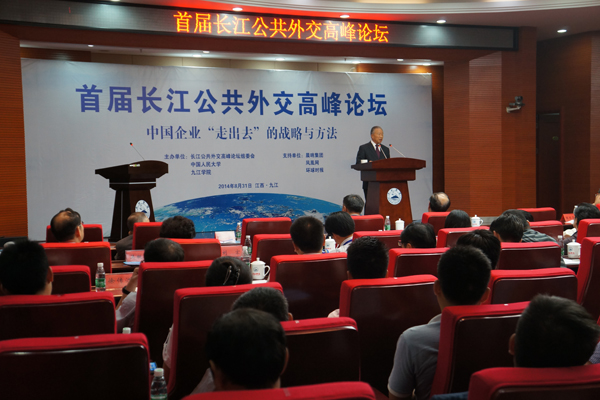Public Diplomacy Summit eyes outgoing Chinese firms
- By Wu Jin
 0 Comment(s)
0 Comment(s) Print
Print E-mail China.org.cn, September 3, 2014
E-mail China.org.cn, September 3, 2014
|
Dai Bingguo, former state councilor, speaks at the First Yangtze River Public Diplomacy Summit held last Sunday in Jiujiang, Jiangxi Province. [China.org.cn] |
The suspension of the Myitsone Dam in Myanmar has caused substantial losses to China Power Investment Corporation (CPI Group), the investor of the project, and hopes of resuming the construction, which started in December, 2009, remain slim.
Subtleties in the political situation in Myanmar may be the major element behind the suspension of the dam, but the CPI Group is not the only company that has its overseas projects obstructed. The Shanghai Automobile Industry Corporation's acquisition of Ssang Yong Motor Company in South Korea is another example of the difficulties Chinese companies face when going abroad.
As the world is not so accustomed to China's rapid development, a new round of containment from the foreign countries on the emerging economy will surely hinder domestic companies' efforts in going global, said Chen Jian, China's former deputy minister of commerce.
Chen conveyed his views at the First Yangtze River Public Diplomacy Summit held last Sunday in Jiujiang, Jiangxi Province. The summit held by Renmin University of China in Beijing, and Jiujiang University, Jiujiang, discusses public diplomacy strategies for companies in China with an international outlook.
"But in addition to the external factors, there are a number of internal problems denting the credibility of Chinese enterprises in the overseas market," said Chen.
"Chinese enterprises sometimes are seen to be less aware and compliant in terms of legal, social and moral accountabilities. Some of them are short-sighted and don't have a spirit of teamwork. Their management and operation are unspecified and a lack of self-discipline leads them into bribery and other offenses," Chen explained.
Chen's remark was echoed by Zhou Xinyu, a senior researcher from the Center for Public Diplomacy Studies at Beijing Foreign Studies University. In spite of changing political situations, domestic companies should learn more before setting out to target countries to reduce investment risks, Zhu said.
A dispute between ZTE Corporation and African workers exemplified Zhou's point. The African workers refused to work at the construction site of ZTE Corp's shaft furnace because the company did not build a flush toilet, which was required by the local law in high-rise scaffolds.
"The process for a company going abroad is actually the internationalization of its staff," Zhou said.
According to Zhao Qizheng, former minister of the State Council Information Office, a charm offensive is important for firms going global.
"Public diplomacy is about cosmetics rather than a surgical knife as it can powder a face but cannot change its features. The air of cultivated people can seldom be worn by the nouveau riche wherever they go," Zhao said.
But despite these issues of self-discipline and cultivation, there are brownie points which can be easily added to outbound firms to win favors.
Huang Youyi, former deputy president of the China International Publishing Group (CIPG), said business leaders in China should change their writing style from official reports to something more interesting for the overseas audience, helping their speeches bridge rather than widen the gap between the countries.
"It is useless to write that companies are under the auspices of governments, which is prioritized in Chinese speeches," he said, "In many foreign countries, business people favor private firms as partners rather than government-funded ones."







Go to Forum >>0 Comment(s)